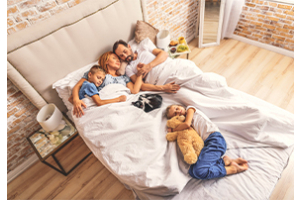What is your sleep age? And can quality sleep help to slow aging?

The Sustainable Benefits Of Healthy Sleep.
You’re 30 years old, but you sleep like a 60-year-old. Or, you’re 60 years old and you sleep like a 30-year-old. How, possibly, can a concept like ‘sleep age’ be a thing? And why should it matter?
A recent Stanford University study* by sleep expert Dr Emmanuel Mignot indicates a correlation between the quality of our sleep and the rate at which our body ages. And even predicts our mortality! Sustained lack of proper sleep can take its toll in later life. Good quality sleep, however, will likely sustain your vitality.
Sleep age is equivalent to quality sleep
To get a quick insight, let’s take a snapshot of two hypothetical lifestyle scenarios:
- First, meet Patrick and Elizabeth. They’re in their early thirties and recently celebrated their fifth wedding anniversary. Beth has just given birth to not one, but two baby girls. Yay. Double trouble. Paddy is a talented, high-performing salesman. Beth is an unenthusiastic auditor. It’s a stable job. But it’s like she feels duty-bound to stick to it. She needs to be the steady earner. Paddy’s commission doesn’t always hit his targets.
- Then there’s Lunga and Alicia. They’re at a more advanced time of life. Their younger son and daughter-in-law are about to produce another grandchild. Having spent almost their entire working lives running a successful boutique hotel together, Lunga and Alicia are not really the retiring sorts. They’ve now become consultants to the hospitality industry. It’s their passion.
Now, let’s compare these hypothetical, though not implausible, lifestyle scenarios in terms of sleep health.
The worse you sleep, the older you become
On average, an adult requires 7-9 hours of deep, uninterrupted sleep every night. That’s the ideal. But, as we know, life happens.
Let’s start with Paddy and Beth’s current life scenario:
- They’re doing fine financially, so no problems there. Having twins is a double blessing. But it also comes with twice the challenge.
- Beth is the one to get up when the little ones aren’t sleeping or need feeding. She’s on maternity leave.
- Paddy tosses and turns when interrupted. By morning, he’s a little groggy. But he’s up and at it.
- Within a few months, Beth is back at work and she and Paddy are doing nightshift sharing the caring. The girls can be quite demanding.
- Beth keeps more regular office hours, so she’s the one to collect the girls from day-care.
- Part of Paddy’s job is to schmooze and entertain prospective clients. Often, he’s home late, exhausted.
- The daily work commute for both of them is like they’re perpetually stuck in time.
- Beth begins to feel that she’s single-parenting. It’s becoming an issue. And she’s at a job every day that doesn’t quite fulfil her personal goals or potential.
We all know where this might be heading. There will likely be words. But somehow, they’ll work things out. In the meantime, the months turn into the next few years. And the years become a blur of constant drag and tiredness. There’s no time for relaxation. No exercise. Balanced meals become eat-on-the-run. And fully restorative, decent sleep? In your dreams.
The better you sleep, the younger you feel
By comparison, let’s imagine what Lunga and Alicia’s life might have been like when they were in their 30’s and were just starting a family:
- Their daily routine would have been non-stop. When they weren’t making small talk with guests, they were managing staff, or dealing with unexpected curveballs. And then there was always the admin paperwork, which they did mostly in the early evenings.
- They lived on site. Their hotel business was also their home. It wasn’t particularly cosy, but that’s what you do when you’re paying off major financing. And bringing up two little blighters.
- Day care for the boys was also near at hand. Convenient. No commuting.
- Behind closed doors, Lunga and Alicia could easily have a raging go at one another. But it would be left outside the bedroom door come night-time. Some spouses are able to separate their business from family life.
- Lunga took to parenting more than his better half did. He was probably the more attentive parent, while Alicia was the focused businesswoman.
- As the boys grew, having them around seemed to add to the charm of staying at the hotel. It became simply an extension of a warm and very personal stay at a home-from-home.
- Starting a family, there was no less demand on them being attentive and caring parents. Yet, given their lifestyle circumstances, perhaps Lunga and Alicia enjoyed the advantage of a far more contained and manageable environment.
Times were good. And times could be worse. But, overall, Lunga and Alicia would seem to have more control over their daily, and nightly, family lives. They managed a routine that included moderate exercise, healthy square meals and, generally, a decent night’s rest.
The ageing implications of poor sleep
Now let’s get back to Dr Emmanuel Mignot’s sleep age study.
Sleep, as we know it, is meant to be restorative. We need proper cycles of deep sleep through the night to allow our minds and bodies to relax, regenerate and recharge for the next day. The brain retains and stores information. Heart rates slow down to a steady, restful beat. The immune system flushes out antigens to keep our bodies safe and healthy from the threat of illness or disease.
With sustained periods of poor or disordered sleep, our bodies begin to feel the strain of compromised functioning. This can manifest itself in daytime lethargy, uncharacteristic mood swings, weight gain, or even the gradual development of a morbid condition. We land up in a cycle of days that drag into nights of perpetually poor sleep. And, as our bodies become unsustainably weaker, it can have the same effect as ageing. In fact, as we approach our 50s, 60s and 70s our sleeping patterns can change to shorter, more interrupted sleep periods, precisely because our metabolisms are changing as we get older.
Fortunately, we can also reverse our sleep age by following a healthy daily routine that ensures a decent night’s kip, every night. Paddy and Beth will likely find things easier as their family grows up. Having a young family, nurturing a relationship and holding down a job is just a multi-tasking, sometimes very demanding, time of life that needs to be managed as best they can. Not everyone enjoys the Lunga and Alicia scenario of being relatively in control of each day. They, too, would no doubt have their stresses and challenges. But at least they would sleep on it and feel more ‘youthfully’ recharged for every next day.
Get your best beauty sleep at Dial•a•Bed
No matter what life throws at you, always ensure you have the perfect support and comfort to see you through each night. If you’re continually pressed for time, head straight for Dial•a•Bed where you’ll find South Africa’s largest selection of leading bed brands. Try out every conceivable mattress design and engineering under one roof.
And, by the way, mattresses age, too. If you’ve been sleeping on the same mattress for over 8 years, it’s definitely time for your next comfort zone. Start exploring online at www.dialabed.co.za. Then find your nearest store and flop back onto a few mattress options. You’ll feel younger already! #SleepForLife.
TAKE CARE: Lifestyle recommendation is not medical advice. Always consult your healthcare professional should you be experiencing prolonged sleep difficulties or related health issues. *
“Age estimation from sleep studies using deep learning predicts life expectancy.” – 22 July 2022.





